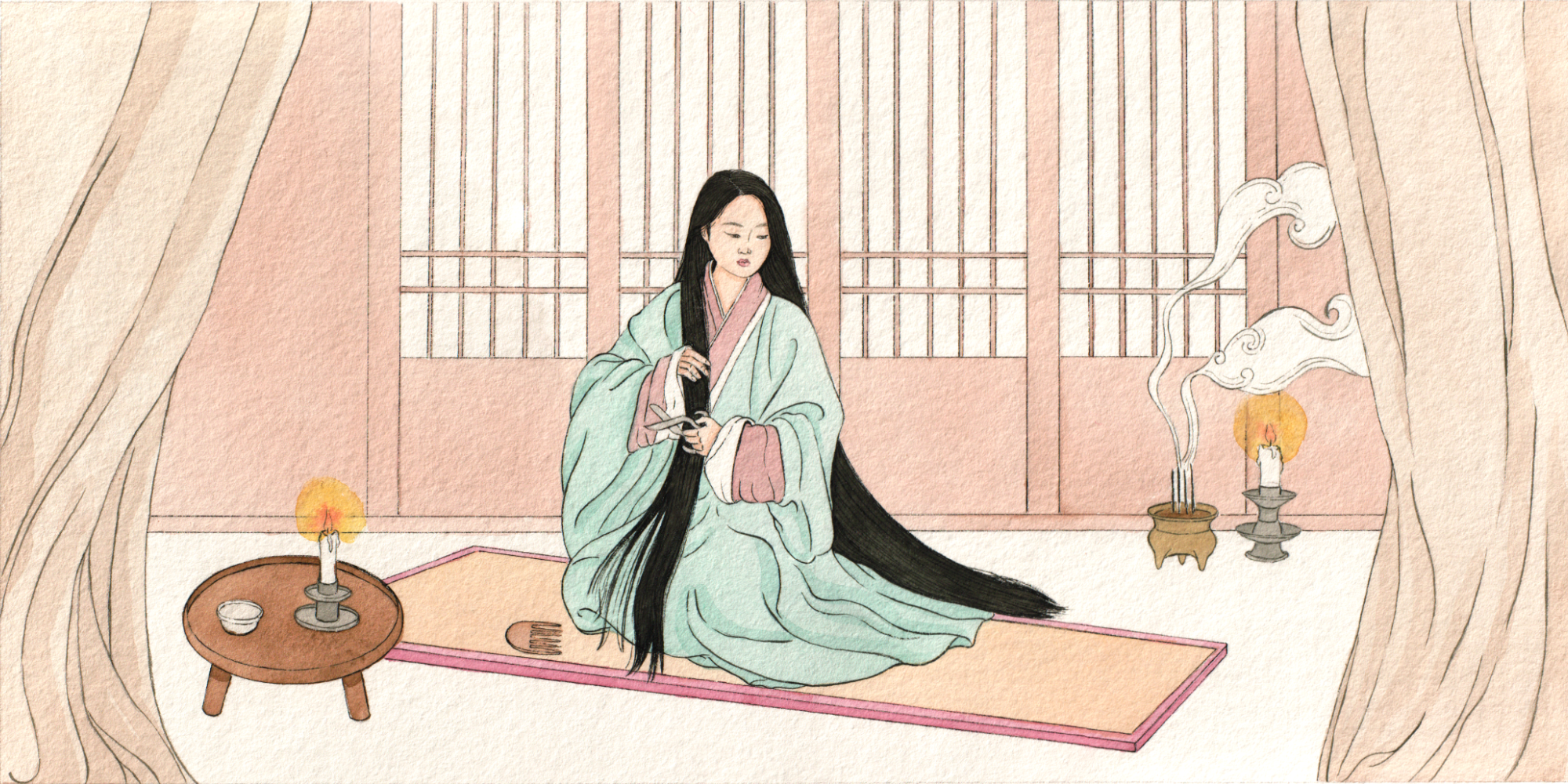
The Mother of Tao Kan, One of the Four Virtuous Mothers
By Evan Mantyk
The ancient Chinese children’s encyclopedia A Beautiful Collection of Primary School Texts (Yuxue Qionglin) tells of an amazingly selfless mother: “Kan‘s mother cut her hair to welcome the guests while the village woman killed a chicken to treat the guests. This is how a virtuous woman should be.” Here, “Kan‘s mother” refers to the mother of the Eastern Jin Dynasty general Tao Kan. She was praised for her exemplary child-rearing and kindness towards others. Alongside the mothers of Mencius, Ouyang Xiu, and Yue Fei, she has been honored as one of the "Four Virtuous Mothers" in Chinese history.
Tao Kan, a native of Duchang County, Jiangxi Province, was a famous general of the Jin Dynasty. He was born into a humble family and lost his father at a young age. He was educated by his mother. Tao Kan was strict in his work ethic, diligent in his duties, and lived frugally. He once supervised the construction of a ship, ordering his subordinates to collect all the remaining bamboo and wood scraps to make bamboo nails; when it snowed and then cleared, causing muddy roads, he ordered the wood scraps to be spread on the ground. Many years later, during a war, when there was a shortage of bamboo nails for building large ships, the bamboo scraps collected by Tao Kan played a significant role. During his tenure as the governor of Jingzhou, he brought peace and stability to the region, and the local people held him in high esteem. After his death, he was posthumously honored as the Grand Marshal and left behind a collection of essays. The famous pastoral poet Tao Yuanming was his grandson.
Tao Kan's integrity, self-discipline, and thriftiness were all attributed to his mother's consistent and strict upbringing. According to one story, Tao Kan's mother, known as Madame Zhan,lost her husband not long after giving birth to Tao Kan. Madame Zhan worked diligently every day to provide for Tao Kan's daily needs while also encouraging him to make friends with knowledgeable and talented people. Therefore, Tao Kan had lofty aspirations and extraordinary insights from a young age. There are two notable stories recorded about Madame Zhan.
Mrs. Kan’s Haircut Banquet and Feeding the Horses with Shredded Mats
A highly respected man in the same county as Tao Kan, named Fan Kui, was recommended as a filial and incorruptible official and needed to stay at Tao Kan's house when he went to take up his appointment. It had been snowing for several days and Tao Kan's house had nothing to offer, while Fan Kui had many carriages, horses, and servants. Tao Kan was very anxious, so his mother said to him, "You just need to keep the guest outside, and I will take care of the rest."
Madame Zhan had long, beautiful hair that could reach the ground when let down. She reluctantly cut it off, made two wigs, and exchanged them for several bushels of rice at the market. Then she chopped half of the thin house pillars in their home to use as firewood, and shredded the sleeping mats to feed the horses. In the evening, a sumptuous dinner was served at home, and even Fan Kui's attendants ate and drank their fill. Fan Kui admired Tao Kan's talent in conversation and was deeply moved by the hospitality of Tao Kan and his mother. When he learned that Madame Zhan had cut her hair to welcome their guests, he couldn't help but exclaim, "Without such a mother, there would be no such son!"
The next morning, Fan Kui bid farewell, and Tao Kan reluctantly saw him off for nearly 30 miles and was still unwilling to return. Fan Kui said, "You can go back now. When I arrive in Luoyang, I will surely speak highly of you." After arriving in Luoyang, Fan Kui spread the story of Tao Kan and his mother, and Tao Kan gradually became well known.
Building the Altar and Returning the Fermented Fish
When Tao Kan was young, he served as a minor official in the Xunyang County government and managed the fish market's transactions. One day, he obtained a jar of fermented fish. He was reluctant to eat it himself, so he sent it to his mother. At first, his mother was pleased, but when she learned that it was an official gift, her face immediately darkened. She resealed the fermented fish and attached a letter, instructing someone to take it back immediately. When Tao Kan opened his mother's letter, he saw her stern reprimand: "You are an official, yet you are giving me public property. Do you think I would be happy about this? No! On the contrary, I am not only not pleased, but I am also worried for you." He was greatly shocked and felt deeply ashamed. From then on, Tao Kan became even more cautious in his official duties and was always praised for his integrity, diligence, and dedication.
The Ming Dynasty scholar Zhang Jiushao once praised Madame Zhan: “If all the mothers in the world could educate their children like Madame Zhan, would the country need to worry about a lack of talent?”
In order to commemorate this righteous mother, a Virtuous Mother's Temple was built in the place where Madame Zhan had once lived in Changsha City in modern China, and the street where the temple was located was called Respecting Virtue (Lixian) Street.























